READER COMMENTS ON
"BREAKING - US District Court Sends CA Lawsuit Against Diebold Back To State Court"
(23 Responses so far...)
COMMENT #1 [Permalink]
...
Bluebear2
said on 7/18/2006 @ 7:00 pm PT...
This is great! Thank you Judge Saundra Brown Armstrong!
COMMENT #2 [Permalink]
...
Dredd
said on 7/18/2006 @ 7:00 pm PT...
John, the CA attorney general is a democrat. Correct?
His client, McPherson, is a republican. Correct?
So is Lockyear a traitor for trying to get the case to the feds, or does he know something we do not?
I have not read the pleadings, etc, so I am not up on this case.
Please advise.
COMMENT #3 [Permalink]
...
Agent99
said on 7/18/2006 @ 7:06 pm PT...
Dredd
The AG has to act for the State, not the party.
COMMENT #4 [Permalink]
...
Patrick Dodd
said on 7/18/2006 @ 7:47 pm PT...
COMMENT #5 [Permalink]
...
Patrick Dodd
said on 7/18/2006 @ 8:03 pm PT...
Brad,
You are so right. Issue politics is no longer effective when we have no influence on politicians who are guaranteed elections through fraud. We need to all focus on taking back our democracy.
Musical Sounds of Resistance
COMMENT #6 [Permalink]
...
Dredd
said on 7/18/2006 @ 8:28 pm PT...
Agent99 #3
Even if the state is wrong? (or was the 'state' right?)
Since you piped up, please explain the issues in at least 50 words ... or give me a link to the court order and I will tell you what happened.
COMMENT #7 [Permalink]
...
Agent99
said on 7/18/2006 @ 8:39 pm PT...
Dredd
The California AG office represents all State agencies, and citizens, too, and this gets thorny as heck! I've bumped into this problem before when I wanted satisfaction against the Department of Forestry and Fire Protection. I don't understand the nuances of that set up, not versed in administrative law, which seems to be where it's at nowadays, to my utter horror. But, my point was that whatever problem you have with the Democrat AG representing the Republican SoS, it's his duty... and maybe he was looking out for the rest of us too, since it got kicked back, and this is a good thing. Are there fifty words here yet? I'm damn partisan too, but I'm not quite willing to beat up on Lockyear over it. He may have "tried to get the case to the feds" precisely because, somehow, it really was in the best interest of Californians to go there, getting it kicked back, and make the lower court deal appropriately with it. Dunno, but that was my point. AG must represent all State agencies in lawsuits.
Maybe they locked him up expressly to keep us from using him against Haas!!!! Now I know I've used the fifty words. 
COMMENT #8 [Permalink]
...
Agent99
said on 7/18/2006 @ 9:22 pm PT...
Dredd
Now that I've read the entire post, I see they certainly didn't lock him up to prevent him from smacking down Haas... had different scenario in my head.
BUT
If Lockyear does not provide the best defense for his client, even if he hates his guts, he's in very hot water. He can't not use whatever means are available to him in the SoS's defense, even if the Governator were not, probably, breathing down his neck about it, and his client. It is NOT DONE, against Bar Association ethics, taboo.
COMMENT #9 [Permalink]
...
Jerry O\\\'Riordan
said on 7/18/2006 @ 9:57 pm PT...
How excited and enthused is Secretary of State Bruce McPherson on these election shenanigans with the Diebolds??? Oh, Kinky, we have a secretary of state who doesn't want to cooperate!!! Texans have a way of dealing with folk who are slow to take the initiative!!!
COMMENT #10 [Permalink]
...
Larry Bergan
said on 7/18/2006 @ 10:40 pm PT...
My representative Jim Matheson is holding a hearing tomarrow, July 19, entitled:
Voting Machines: Will New Standards and Guidelines Prevent Future Problems?
2:00p.m. - 4:00p.m.
The people who read this blog will already know the answer to that question!
There will be a webcast avaliable after the hearing that I will post for anyone interested.
I sent the following message to Mr. Matheson:
The following exerpt from Rolling Stone magazine (you have to read a music magazine these days to find out important facts), talks about open fraud involving HAVA. Isn't it time to stop playing around with this issue get some real verification in our elections, even if we need to go to hand-marked, hand-counted ballots for 2006. Tom Delay was responsible for not allowing the issue to be considered even after both parties signed up. The HAVA act is a disgrace that should be condemed, not followed. Please make sure to do anything possible before 2006!
Thanks!
http://www.rollingstone....republican_jack_abramoff
And now it comes out that Diebold, the notorious voting-machine company, paid some $275,000 to Abramoff's firm, Greenberg Traurig, with the apparent aim of keeping legislation requiring paper trails in the voting process from getting into the Help America Vote Act. Conveniently, Abramoff pal Bob Ney, one of the HAVA architects, blocked every attempt to put paper trails into law, even after the controversial electoral debacles of 2000 and 2004.
COMMENT #11 [Permalink]
...
Dredd
said on 7/18/2006 @ 11:39 pm PT...
Agent99 #7, #8
Well my dear, we have come across what some federal judges used to call the "tour de force" before the jurisdictional statute was improved.
The subject matter is "removal jurisdiction" (link here), and I have seen this one a time or two. 
What troubles me is the grand-standing done in a scenario where nothing happened, in one sense.
I mean the merits are irrelevant in this type of decision ... who will win or who will lose ... are not addressed in this type of decision.
The only issue addressed is "did the federal court have original jurisdiction" of the subject of the complaint.
If someone says it indicates who may or may not eventually win, they are full of shit or sh*t, depending on which paper it is reported in.
COMMENT #12 [Permalink]
...
Agent99
said on 7/19/2006 @ 12:05 am PT...
Dredd
Okay, the merits may not have been in his client's or the Governator's best interest to have adjudicated in as timely a fashion as possible, and so my point still stands. Lockyear is ethics-bound, in this case, to piss us off royally. Mayhap State Law will be easier for Plaintiffs to win with than Federal... and certainly CHEAPER.
Just a minute ago found a link to Feingold on Hamdan at KOS on Talk Left, and thought you'd be interested. I am, but I'm allergic to KOS, and so will have to muster the moxie to follow my own link through Talk Left to read it.
COMMENT #13 [Permalink]
...
Agent99
said on 7/19/2006 @ 1:51 am PT...
PS Dredd
I mustered the spit, and it was very simply put... yadda, yadda, yadda... so we oughta censure the bad widdle pwez. Sheesh. ITMFA, Russ! Then got the mettle together to watch the House Armed Services Committee hearing on Hamdan in the C-SPAN video archives. I tried. I really tried, but it felt as if they were holding me down and pouring poison in my ear. My insides were trading places. Couldn't make it through the Chairman's blather. Tried fast forwarding into the testimony, and it got still worse for my poor aching nerves.
So I just had the "satisfying" experience of shutting their damn yaps with one snappy mouse click. Would that I could have shut them up that easily for real. 
COMMENT #14 [Permalink]
...
Dredd
said on 7/19/2006 @ 5:05 am PT...
Agent99 #12
If you do not know what the complaint says, which is what establishes federal removal jurisdiction, then you do not know what the merits are.
And so you can't have a point about the merits.
I don't know what the merits are either, because I have no seen the complaint.
But what the federal court said was that the complaint did not establish any federal jurisdiction.
Which makes me wonder why HAVA was not at issue. It must be based completely on state law, if not on federal law.
I do not know why Lockyear thinks the feds would be better for McPherson.
The feds have been better than the state courts on voting issues lately ... better for the people. And the feds have been chastening the president too.
It would be a good think to see the state courts step up and do the same.
Hope is all we have at the moment.
COMMENT #15 [Permalink]
...
Robert Lockwood Mills
said on 7/19/2006 @ 5:42 am PT...
"Federal district court sends issue back to state court." In other words, running an election is a state matter, entirely within the province of state election officials and state courts.
If only the SCOTUS had known this in 2000.
COMMENT #16 [Permalink]
...
Agent99
said on 7/19/2006 @ 6:18 am PT...
Dredd
I'm working to make it more than just hope, but yes, hope is about the size of it as of yet, but the hope is getting more justifiable.
The Feds might have been better for the case, and might not. I'm trying to say only that Lockyear would have tried the removal, almost certainly knowing it would be denied, merely to buy time, which is in his client's interest. That's his job. The merits have nothing to do with the maneuver. Wasting time is their gig. Lockyear surely doesn't like it, but he hasn't got any choice. That was all I was saying.
The idea that his political affiliation ought to bear on his actions is not in accord with the realities he, or any other AG, must face. So, the plaintiffs are gathering optimism from his "loss". We can't really say anything effective about the case, because neither of us has read the pleadings. It may, or may not, be easier to get satisfaction from this suit in Superior Court, but, certainly if it's kicked back to it, there is more room for appeal if things go badly. Look at it that way.
Bed. Bed. Bed. I'm dead.
COMMENT #17 [Permalink]
...
Dredd
said on 7/19/2006 @ 6:57 am PT...
Agent99 and RLM
I read the memorandum and it says:
The Court lacks federal question jurisdiction in this case for two reasons. First, each of the causes of action in the Petition is based on state law violations which supply grounds for liability unrelated to HAVA. The Ninth Circuit has held that federal jurisdiction does not lie in such cases because resolution of the claims will not necessarily hinge on interpretation of federal law. Rains v. Criterion Sys., Inc., 80 F.3d 339, 346 (9th Cir. 1996). Second, state causes of action which are premised on violations of HAVA are not sufficient to confer federal question jurisdiction because HAVA contains no private right of action and does not preempt state election laws. Wander v. Kaus, 304 F.3d 856 (9th Cir. 2002).
(link here, PDF). We will know if delay was intended by watching whether or not the remand order is appealed to the 9th Circuit Court of Appeals.
One interesting factor in removal jurisprudence is that a state waives its sovereign immunity when it removes a case to federal court. The plaintiffs must have not considered that to be a big deal.
It is an interesting point that the plaintiffs argue that HAVA provides no private right of action.
That has certainly not been a universally held viewpoint:
One expert says it would be ”extraordinary” if private citizens could not sue to enforce voting rights under HAVA.
”If one is serious about enforcing civil rights and voting rights you would have a private right of action, and it's just deeply irresponsible to argue that the people who are the most affected by these laws don't have the right to come into court and see them enforced,” says Laughlin McDonald, director of the Voting Rights Project at the American Civil Liberties Union (ACLU).
(link here).
It is also interesting that the plaintiffs are parroting what the regime has been arguing for years:
Lawyers in the office of Attorney General John Ashcroft have been arguing in various court cases in recent weeks that private citizens have no right to sue to enforce sections of the Help American Vote Act (HAVA), which was passed after the controversial 2000 election fiasco.
...
The Los Angeles Times reported last week that lawyers for Ashcroft argued in three court cases in late October that only the Justice Department can sue to enforce the provisions in HAVA.
(ibid). Oh well, elections make strange bedfellows. 
COMMENT #18 [Permalink]
...
Robert Lockwood Mills
said on 7/19/2006 @ 7:24 am PT...
For Dredd: I'm not a lawyer. But what I'm reading about current rulings suggests that the Supreme Court in 2000 acted improperly by interfering with the Florida Supreme Court. Am I misreading the situation? Is this not a federalism question?
Suppose the 2008 presidential election becomes a repeat of 2000 and 2004. Hair-breadth close, with claims of fraud on both sides. Enough electoral votes are in dispute to determine the outcome. Nobody has conceded, and the courts in several states are ruling in favor of recounts, as Florida did in 2000. Will the SCOTUS again decide the issue? Aren't we entitled to know if the Electoral College reserves for states the right to determine election outcomes, as we always thought until the Rehnquist court decided otherwise?
COMMENT #19 [Permalink]
...
Floridiot
said on 7/19/2006 @ 7:47 am PT...
Good Questions RLM
As Nero fiddles...
COMMENT #20 [Permalink]
...
big dan
said on 7/19/2006 @ 8:27 am PT...
Why do citizens have to take election officials to court? Instead of them just doing their job?
COMMENT #21 [Permalink]
...
Arry
said on 7/19/2006 @ 9:55 am PT...
It's not too early to put the germ of the idea of impeachment of Supreme Court justices in the back of our minds.
The December 2000 decision not only interfered with Florida Judicial system and the Florida counting standards which were reasonable according to the Florida Supreme Court, but disenfranchised thousands of voters which is likely an impeachable offense.
COMMENT #22 [Permalink]
...
Arry
said on 7/19/2006 @ 11:00 am PT...
...and that's Lockyer guys.
COMMENT #23 [Permalink]
...
Dredd
said on 7/20/2006 @ 6:56 am PT...
RLM #18
Your observation on Bush v Gore is the most prevalent in legal scholar circles. And it is my view as well. I think they descended into politics in what was a state right, and they committed fornication  .
.
However the case at hand concerns removal jurisdiction, which is a narrow band of jurisprudence where cases filed in state court can be removed to the federal court, if, based upon the allegations in the complaint, there is a "federal question".
A "federal question" is one that means the case could have been filed in the federal district court in the first place. Federal courts do not have original jurisdiction of state law issues, but can decide those issues if a federal question is present in the complaint and the case is "removed" to federal court.
As I point out in my post #17, Lockyer (thanks Arry) removed it to federal court.
That is strange in at least one aspect ... the state gives up its inherent sovereign immunity when it does that. Which can weaken their defenses some.
Another strange anamoly is that the plaintiffs, ostensibly voting rights afficionados, argue that HAVA does not give a "private right of action" (you or I or any voter can sue), which as I also pointed out in post #8, is an idea Ashcroft came up with, and one that many scholars disagree with.


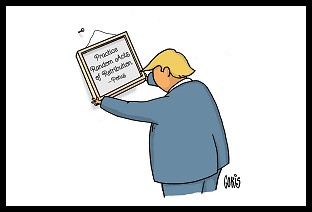 Sunday 'Random Acts of' Toons
Sunday 'Random Acts of' Toons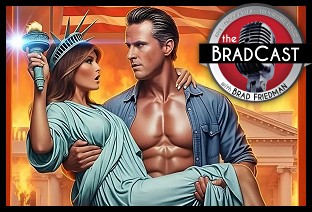 From CA's 'Nuclear Deterrence' Map to Newsom's Trolling to Trump's 'Fascist Theatre' and Beyond: 'BradCast' 8/21/25
From CA's 'Nuclear Deterrence' Map to Newsom's Trolling to Trump's 'Fascist Theatre' and Beyond: 'BradCast' 8/21/25 'Green News Report' 8/21/25
'Green News Report' 8/21/25
 On 'Americanism' and Trump's 'Stalinesque' Plot to Whitewash U.S. History: 'BradCast' 8/20/25
On 'Americanism' and Trump's 'Stalinesque' Plot to Whitewash U.S. History: 'BradCast' 8/20/25 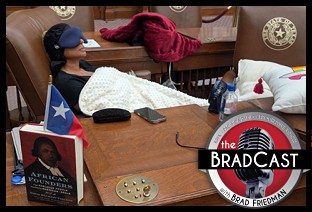 Texas GOP Imprisons Dem State Lawmaker in State House Chamber: 'BradCast' 8/19/25
Texas GOP Imprisons Dem State Lawmaker in State House Chamber: 'BradCast' 8/19/25 'Green News Report' 8/19/25
'Green News Report' 8/19/25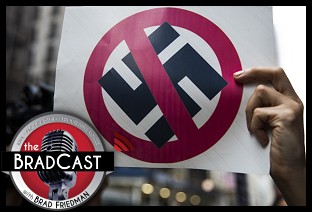 Trump, Nazis and
Trump, Nazis and 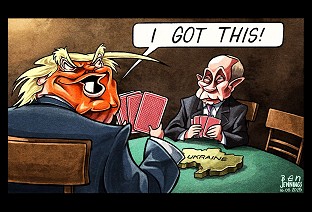 Sunday '
Sunday ' Newsom's 'Election Rigging Response Act'; FCC's License Renewal for Sock-Puppeting Sinclair: 'BradCast' 8/14/25
Newsom's 'Election Rigging Response Act'; FCC's License Renewal for Sock-Puppeting Sinclair: 'BradCast' 8/14/25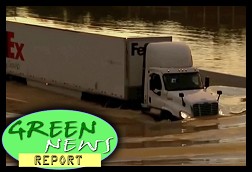 'Green News Report' 8/14/25
'Green News Report' 8/14/25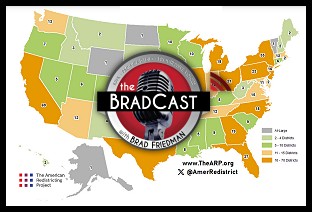 140 New House Reps?: Moving Beyond the Gerrymandering Wars: 'BradCast' 8/13/25
140 New House Reps?: Moving Beyond the Gerrymandering Wars: 'BradCast' 8/13/25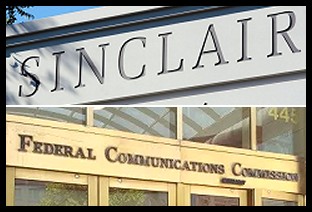 FCC Renews Sinclair TV Licenses Despite Complaint from Petitioner Who Died Waiting
FCC Renews Sinclair TV Licenses Despite Complaint from Petitioner Who Died Waiting It's Not About the Rule of Law, It's About Authoritarian Control: 'BradCast' 8/12/25
It's Not About the Rule of Law, It's About Authoritarian Control: 'BradCast' 8/12/25 'Green News Report' 8/12/25
'Green News Report' 8/12/25 After Vaccine Cancels, CDC Shooting, Former Officials Want RFK Out: 'BradCast' 8/11/25
After Vaccine Cancels, CDC Shooting, Former Officials Want RFK Out: 'BradCast' 8/11/25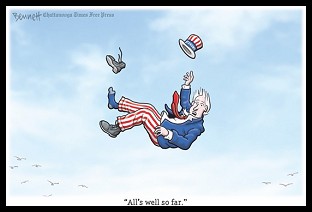 Sunday 'All's Well' Toons
Sunday 'All's Well' Toons 'Green News Report' 8/7/25
'Green News Report' 8/7/25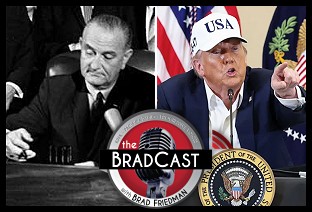 Trump Wars Against Greem Energy, Democracy on VRA's 60th: 'BradCast' 8/7
Trump Wars Against Greem Energy, Democracy on VRA's 60th: 'BradCast' 8/7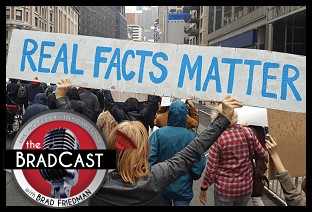 Media Conglomerates Continue Trump Capitulation: 'BradCast' 8/6/25
Media Conglomerates Continue Trump Capitulation: 'BradCast' 8/6/25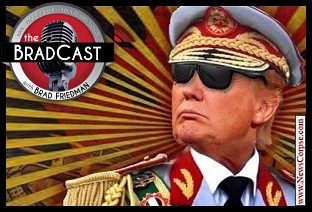 Banana Republican: Trump Shoots the Labor Statistics Messenger: 'BradCast' 8/5/25
Banana Republican: Trump Shoots the Labor Statistics Messenger: 'BradCast' 8/5/25 All's Fair in Love, War and, Apparently, Part-isan Gerrymandering: 'BradCast' 8/4/25
All's Fair in Love, War and, Apparently, Part-isan Gerrymandering: 'BradCast' 8/4/25 The Art of the Corrupt, Phony, Unlawful, Pretend Trade Deal: 'BradCast' 7/31/25
The Art of the Corrupt, Phony, Unlawful, Pretend Trade Deal: 'BradCast' 7/31/25 Battle Begins Against Trump EPA Climate Regulations 'Kill Shot': 'BradCast' 7/30/25
Battle Begins Against Trump EPA Climate Regulations 'Kill Shot': 'BradCast' 7/30/25 A Pu Pu Platter of Trump Corruption: 'BradCast' 7/29/25
A Pu Pu Platter of Trump Corruption: 'BradCast' 7/29/25 'Catastrophic' GOP Cuts to Medicaid, Medicare, ACA: 'BradCast' 7/28/25
'Catastrophic' GOP Cuts to Medicaid, Medicare, ACA: 'BradCast' 7/28/25
 VA GOP VOTER REG FRAUDSTER OFF HOOK
VA GOP VOTER REG FRAUDSTER OFF HOOK Criminal GOP Voter Registration Fraud Probe Expanding in VA
Criminal GOP Voter Registration Fraud Probe Expanding in VA DOJ PROBE SOUGHT AFTER VA ARREST
DOJ PROBE SOUGHT AFTER VA ARREST Arrest in VA: GOP Voter Reg Scandal Widens
Arrest in VA: GOP Voter Reg Scandal Widens ALL TOGETHER: ROVE, SPROUL, KOCHS, RNC
ALL TOGETHER: ROVE, SPROUL, KOCHS, RNC LATimes: RNC's 'Fired' Sproul Working for Repubs in 'as Many as 30 States'
LATimes: RNC's 'Fired' Sproul Working for Repubs in 'as Many as 30 States' 'Fired' Sproul Group 'Cloned', Still Working for Republicans in At Least 10 States
'Fired' Sproul Group 'Cloned', Still Working for Republicans in At Least 10 States FINALLY: FOX ON GOP REG FRAUD SCANDAL
FINALLY: FOX ON GOP REG FRAUD SCANDAL COLORADO FOLLOWS FLORIDA WITH GOP CRIMINAL INVESTIGATION
COLORADO FOLLOWS FLORIDA WITH GOP CRIMINAL INVESTIGATION CRIMINAL PROBE LAUNCHED INTO GOP VOTER REGISTRATION FRAUD SCANDAL IN FL
CRIMINAL PROBE LAUNCHED INTO GOP VOTER REGISTRATION FRAUD SCANDAL IN FL Brad Breaks PA Photo ID & GOP Registration Fraud Scandal News on Hartmann TV
Brad Breaks PA Photo ID & GOP Registration Fraud Scandal News on Hartmann TV  CAUGHT ON TAPE: COORDINATED NATIONWIDE GOP VOTER REG SCAM
CAUGHT ON TAPE: COORDINATED NATIONWIDE GOP VOTER REG SCAM CRIMINAL ELECTION FRAUD COMPLAINT FILED AGAINST GOP 'FRAUD' FIRM
CRIMINAL ELECTION FRAUD COMPLAINT FILED AGAINST GOP 'FRAUD' FIRM RICK SCOTT GETS ROLLED IN GOP REGISTRATION FRAUD SCANDAL
RICK SCOTT GETS ROLLED IN GOP REGISTRATION FRAUD SCANDAL VIDEO: Brad Breaks GOP Reg Fraud Scandal on Hartmann TV
VIDEO: Brad Breaks GOP Reg Fraud Scandal on Hartmann TV RNC FIRES NATIONAL VOTER REGISTRATION FIRM FOR FRAUD
RNC FIRES NATIONAL VOTER REGISTRATION FIRM FOR FRAUD EXCLUSIVE: Intvw w/ FL Official Who First Discovered GOP Reg Fraud
EXCLUSIVE: Intvw w/ FL Official Who First Discovered GOP Reg Fraud GOP REGISTRATION FRAUD FOUND IN FL
GOP REGISTRATION FRAUD FOUND IN FL

































